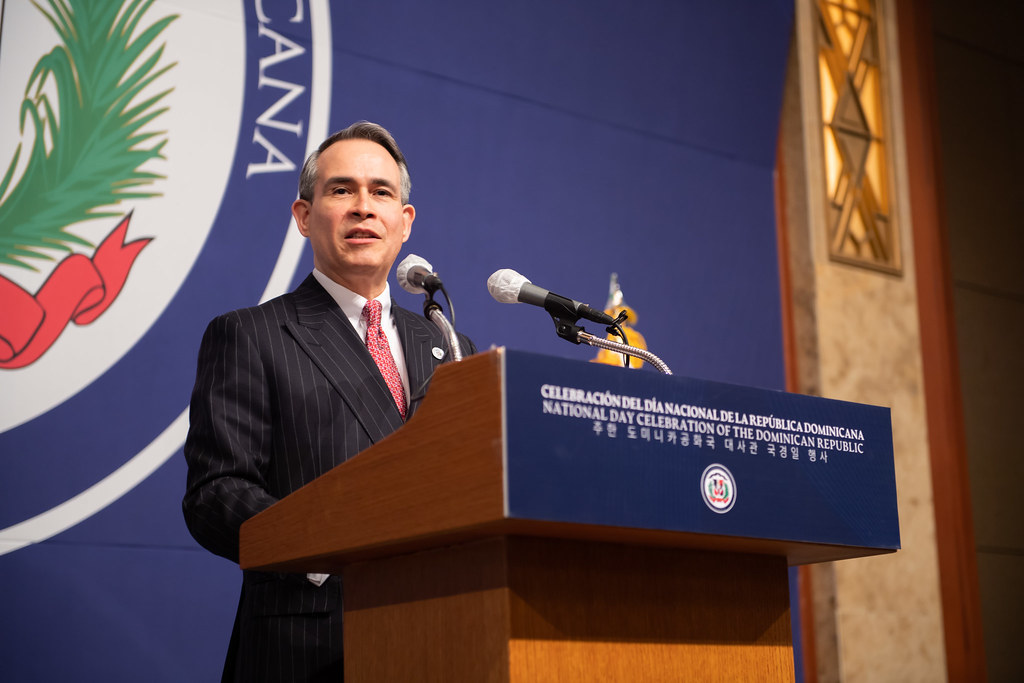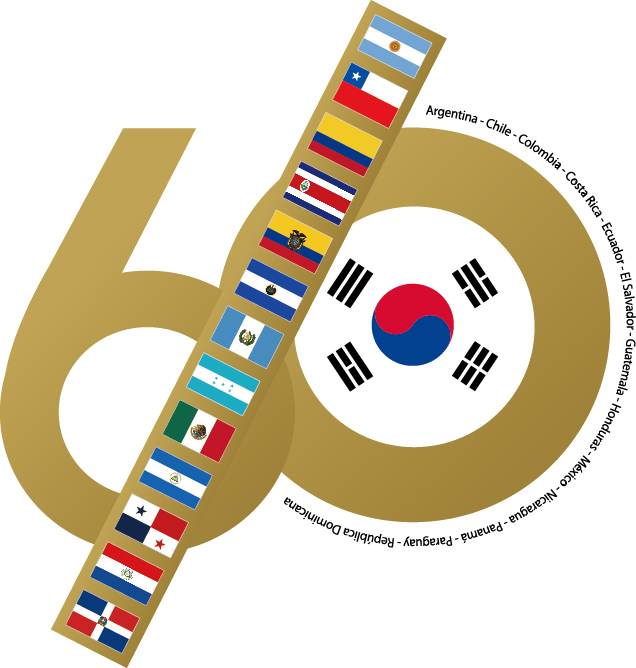 |
Dominican Republic Ambassador to South Korea Federico Alberto Cuello Camilo(Embassy of the Dominican Republic in Seoul) |
In 1962 Korea needed markets in new countries for its nascent strategy of export-oriented industrialization. Diplomatic relations were the first step in that direction. Fifteen Latin American and Caribbean countries benefited from this drive, including mine, the Dominican Republic.
Exporting to my region has contributed to Korea becoming the world’s sixth largest exporter and the 10th largest economy. It is now a leading source of quality products at affordable prices.
Coherence is the one word that comes to mind when thinking about bilateral relations with Korea.
Public policies, say, for climate change and digitalization, are projected immediately through foreign policy initiatives, including generous cooperation efforts, affordable development finance, very detailed technical assistance and ambitious trade and investment agreements.
All this matched, of course, with partners in business ready to deliver the goods and services required, together with the know-how for operations and further development.
The Dominican Republic has always benefited from Korea’s coherence, through knowledge-sharing programs on export development, production of electronics or regulation of medical devices; through education programs in reproductive health or in technical professions; or by reducing transit times in customs from two days to two hours.
This coherence is now in full bloom, just in time for the energy transition -- in compliance with the UN Sustainable Development Goals and the Paris Agreement on Climate Change -- with the New Deal adopted in 2020 as the reference for Korea’s new international initiatives.
As we turn the page on the crisis provoked by COVID-19, the Dominican Republic is keen to follow in Korea’s footsteps toward building-forward better in a strategic alliance on decarbonization, creating a circular economy, digitalization, strengthened social protection, decentralized development and nearshoring.
Decarbonization is no small matter, as it implies achieving carbon-neutrality in all sectors: agriculture, manufacturing, energy, transportation, services and households.
Korea’s New Green Deal is the backbone of the long-term climate strategy we would like to emulate, including the transition to alternative energies in a decentralized fashion, relying on hydrogen-powered fuel-cells, solar panels and wind turbines.
Carbon neutrality should eliminate, eventually, the use of conventional fuels such as carbon, gas and oil. But the manufacture of batteries, fuel cells, solar panels and wind turbines requires extracting and processing aluminum, lithium, nickel, rare earths and many other critical minerals.
Such extraction and processing have yet to become carbon neutral and clean. Thus the urgency of creating a circular economy that ensures full recycling and reuse of critical minerals present in discarded batteries, and minimizing the likely implications that would arise from replacing our reliance on a few “petrostates” for new “electrostates.”
 |
Logo commemorating 60th anniversary of Korea-Latina America diplomatic relations (Embassy of Costa Rica in Seoul) |
Digitalization goes beyond the spread of 5G networks -- operational in the Dominican Republic since early November 2021 -- as it requires adopting new technologies and standards for seamless communications between people, business and things, as well as achieving full online access to public and private services and the intelligent management of cities.
Korea’s New Digital Deal, coupled with the technical assistance from the World Organization of Smart Cities, includes the elements of what the Dominican Republic wants to follow.
Strengthening social protection is an essential element for the transformations ahead. The “fourth industrial revolution” is advancing rapidly, displacing labor in industry -- by robots -- and services -- by artificial intelligence algorithms -- who need to be retrained in order to avoid permanent joblessness.
Strengthened social protections, therefore, go beyond unemployment insurance by aiming at the eventual reinsertion of those displaced. Korea’s proposals in this regard are very much worth considering.
Balanced national development is a public policy pursued in Korea over the last two decades. The alternative is to concentrate production, public services, education and research, increasing the chances for unexpected shocks -- such as COVID-19 -- to cripple the entire economy.
By spreading wealth creation to all regions, decentralized development prevents disruption to one of them from affecting the performance of the rest, thus ensuring national resilience.
Nearshoring production is another policy response arising from the needs for resilience, but at the international level, just in case further disruptions threaten the effectiveness of supply chains to deliver just in time.
By opening new production facilities -- of batteries, medical devices, medicines or semiconductors -- in countries like the Dominican Republic, Korean producers could produce at the low cost, high productivity and minimal taxes we offer, while delivering reliably to final markets with which we have free trade.
While we prepare for the future, Korean firms are already taking advantage of business opportunities. Nineteen firms produce textiles and apparel for export to the US. Samsung and LG dominate in domestic appliances and electronics. Hyundai Motor and Kia are the top two selling brands in automobiles.
Kepco is expanding transmission lines, Posco is enlarging liquefied natural gas storage capacity and SK is investing in LNG generation. SK and Kogas are tendering for further LNG generating capacity. Kogas is tendering for an LNG import, storage and distribution terminal.
And in mass transport, Hyundai E&C and Dohwa Engineering are tendering for light rail in Santiago and Santo Domingo, respectively.
This ambitious agenda is the least we could aspire to -- as we prepare for the next 60 years of bilateral relations -- if we are to leave a better world for our children.
One in which they can continue to enjoy the friendly competition of our baseball players, as well as the creativity of our cultures, whether Korean films and pop music or Dominican bachatas, films, merengues and Latin jazz.
The Dominican Republic hopes this year to share a good sample of this, with the first Dominican Film Festival early in June, a concert by our Grammy-award winner Michel Camilo, the residency in Korea of our top sculptor Juan Trinidad and with gastronomic festivals, Michelin-star VIP dinners and art exhibits during the first Dominican Week in Korea scheduled for early October.
May these initiatives leave no doubt about the importance the Dominican Republic gives to Korea, a country that reached the top in less than two generations, in spite of civil war, colonialism and a difficult neighborhood.
-----------------------------------------------------
Federico Alberto Cuello Camilo is ambassador of the Dominican Republic to South Korea. He contributed this column as part of The Korea Herald’s commemoration of the 60th anniversary of the establishment of diplomatic relations between Korea and 13 Latin American countries with embassies in Seoul. -- Ed
By Sanjay Kumar (
sanjaykumar@heraldcorp.com)







![[Herald Interview] 'Trump will use tariffs as first line of defense for American manufacturing'](http://res.heraldm.com/phpwas/restmb_idxmake.php?idx=644&simg=/content/image/2024/11/26/20241126050017_0.jpg)
![[Health and care] Getting cancer young: Why cancer isn’t just an older person’s battle](http://res.heraldm.com/phpwas/restmb_idxmake.php?idx=644&simg=/content/image/2024/11/26/20241126050043_0.jpg)
